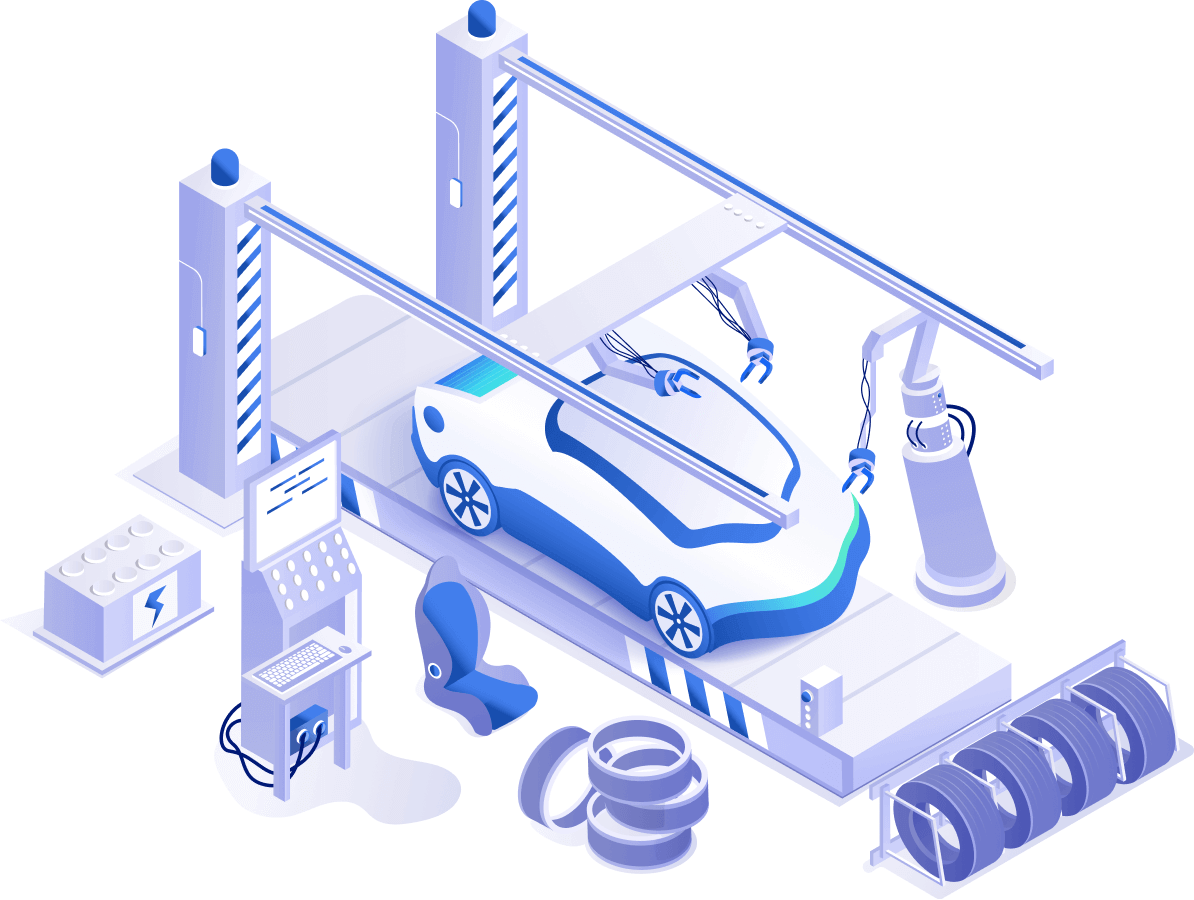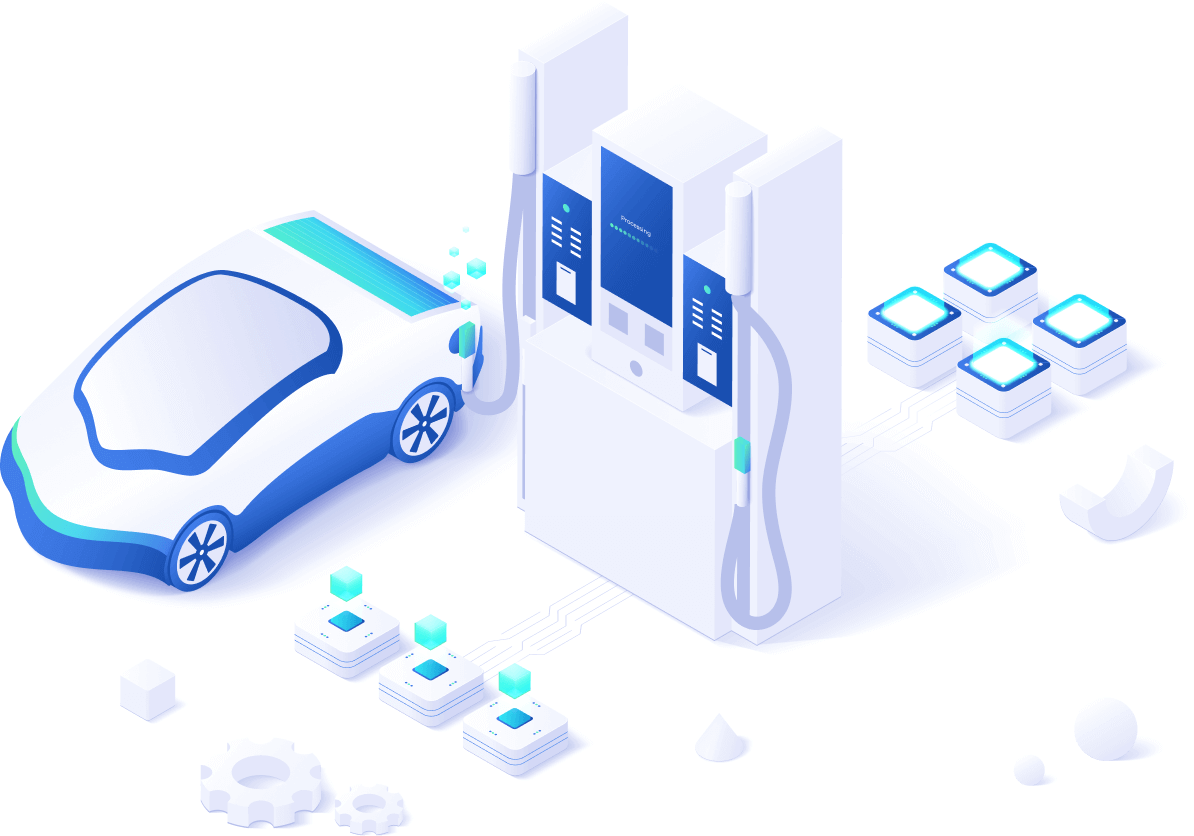Blockchain Development for the Automotive Industry
Accelerate Technology Innovation through Custom Automotive Solutions Development empowered by Blockchain Technology

Mobility Open Blockchain Initiative (MOBI) brings together BMW, Bosch, Ford, Groupe Renault, Accenture, IBM, and others to explore blockchain’s potential in mobility
Blockchain-Based Automotive Solutions
Our blockchain-based custom automotive solution development services empower automotive businesses. From vehicle manufacturing, supply chain traceability, and emerging electric car solutions to ride-sharing and more, we cover wide applications of blockchain in the automotive industry. We have evaluated blockchain's potential across the automotive value chain and found that it is capable of
Authentication and Operational Efficiency
Enhancing efficiencies across the supply chain and back-office operations
- Parts Authentication and Traceability
- Smart Supply Chain
- Specific Vehicle Recalls
- Know Your Supplier (KYS)
Incentivization and Vehicle Management
Augmenting vehicle information management and usage data
- Dealer and Customer Incentivization
- Digital Log Book
- Fake Odometer On-demand
- Mobility and Ride-Sharing
Insurance, Financing, and Payments
Simplifying transactions processes and information exchange
- Insurance Contract Management
- Automated Leasing and Financing
- Connected Customer Services
- Micro Electric Vehicle Payments
Solving Challenges of the Automotive Industry with Blockchain
-
Supply Chain
Problem
Slow, costly, and opaque supply chain activities
Solution
Smart processes on the distributed shared ledger
-
Insurance
Problem
Risk of fraud, slow claim processing, and complex contracts
Solution
Fool-proof automated insurance and settlement payments
-
Manufacturing
Problem
Infiltration of fake or defective parts with no detection
Solution
Traceability of parts origin and integrity from an original equipment manufacturer (OEM) to an automaker
-
Ride Sharing
Problem
Centralized, insecure data, intermediaries, and slow transactions
Solution
No intermediaries, authenticity, and new business opportunities
-
Vehicle Recalls
Problem
Increased costs, incapability of finding specific defective parts
Solution
Quick identification of defective parts, targeted recalls
-
Ownership Transfer
Problem
Inability to verify information, paper-based, and lengthy processes
Solution
Digital ownership records, real-time information verification
Blockchain-Powered Automotive Value Chain
Blockchain brings automotive stakeholders involved in various processes like design, manufacturing, tracking, selling, and vehicle servicing on a single, shared ledger. Thereby, blockchain in the automotive industry enables transparency, accountability, efficiency, and security across the automotive ecosystem
Blockchain-Based Automotive Development Services
Vehicle Parts Traceability and Authentication Solution
We develop automotive supply chain solutions that capture, store, and update the information of vehicles and spare parts on a blockchain. It enables car service centers, car manufacturers, customers, and other stakeholders to track auto-part provenance throughout the supply chain. Our solutions ensure transparency, traceability, and verifiability of automobile components and raw materialss


Vehicle Component Recall Solution
We build automotive applications that enable car OEMs to identify vehicles containing defective parts. Manufacturers can further issue targeted recalls or service bulletins for these vehicles. It can reduce disruption to customers as well as the recall costs for the process. It can ensure no massive recalls that translate to a considerable cost. The solution also enables the status tracking of a recall
Incentive Services Management
Our blockchain solutions enable the issuance of loyalty points for dealers and customers. They can redeem and use those loyalty points as a currency within an automobile loyalty network. Once a customer has redeemed his loyalty points, the solution will update a dealer’s account for network participants to view. We use blockchain and smart contract technology-based solutions for the instant redemption of loyalty points


On-Demand and Ride-Sharing Apps
Our solutions automate contracts and financial transactions to enable vehicle owners to monetize peer-to-peer (P2P) ride trips. They interconnect smart, autonomous vehicles, car-sharing providers, and end-users reliably and securely. They enable users and car-sharing providers to register on the blockchain for secure and seamless data exchange, including vehicle location, contract terms, and user payment information
Insurance Services Management
We develop blockchain applications that enable insurance firms to form customized vehicle insurance contracts as per actual driving behavior. They do so by processing driving behavior events like speeding and mileage and safety events like defective parts and collisions. The solutions efficiently and securely automate automobile insurance claim payments and financial settlements following an insurance claim


Supplier Identity Management
We build blockchain KYS solutions that collect, record, and validate supplier details before a supplier delivers services to automotive companies. Once stored and approved, they execute supplier payments and contracts with smart contracts when a service or product gets fulfilled as per the business agreement. They enable stakeholders to manage supplier digital identities for digital agreements, digital assets, and workflows
Blockchain Platforms That We Use
We implement smart contracts to automate business operations with the following blockchain technologies

Hyperledger

Ethereum

Stellar

Solana

Polygon

Binance

Tron

NEM

EOS

Credits

Corda

Multichain

Hedera Hashgraph
FAQs (Frequently Asked Questions)
Blockchain technology provides the fundamental advantages of decentralization, immutability, encryption, and transparency. It enables authentication without having to rely on third parties. Within a blockchain network, the data structure remains append-only. So, nobody can alter or delete the info.
The new strategic trends in the automotive blockchain industry include the use of technology in finance, automation applications, smart procurement, and supply chains. These applications complement the automotive blockchain industry while contributing to the development of the automotive blockchain market.
Accenture, IBM, Microsoft, Software Mahindra, Carblock, and others are the leading players in the automotive blockchain industry. They have adopted various strategies to retain key market share in the blockchain automotive industry.
Blockchain can address various supply
chain problems by maintaining complex databases and
monitoring products and services. In monitoring and
testing products and services, a blockchain-based supply
chain management system ensures accurate record-keeping and
monitoring of provenance. It does so by enabling product
information access with embedded sensors and radio-frequency identification (RFID) tags.
Blockchain can trace the origin of a commodity right from
its start to where it is in the present time.
Also, this form of exact provenance monitoring can
assist in detecting fraud in any part of the supply chain. The
car supply chain is a highly dynamic and large field that involves
numerous participants, including parts suppliers, producers, and sellers.
With blockchain, automotive suppliers can protect their brands against
counterfeit goods while building customer-centered business models.
Insurers will be able to monitor
claims in an unparalleled manner by looking at a
transparent blockchain-powered database. Fraudulent
claims will be virtually impossible because all the
details will be on the distributed database. Hence,
various complementary but conflicting stakeholders,
frequently untrusting, such as reinsurers, insurers, and brokers,
will have their data shared and stored in the blockchain.
Traditional insurance underwriting can take months,
whereas it can become 'real-time' and
quasi-automatic with blockchain.
Besides, all registered participants can access prior
know-your-customer (KYC) records and related validated documents
instantaneously and safely, using a blockchain.
Insurers will also be able to establish immediate and cheaper policies
by monitoring the driving hours of the vehicle. Thereby, facilitating
strategies like 'pay-as-you-drive.'
A blockchain-based system will enable car manufacturers to recognize vehicles containing faulty components and enforce targeted recalls or sequencing batches. It will reduce the cost of recalls significantly. The solution will monitor the recall status too. It, for example, will track vehicles, the dealer receives for repair. This monitoring can come in use for government reporting on regulatory matters.
 Blockchain Application Development
Blockchain Application Development
 Fintech Blockchain App Development
Fintech Blockchain App Development
 Hyperledger Application Development
Hyperledger Application Development
 STO Development Services Company
STO Development Services Company
 Exchange Development
Exchange Development
 Cryptocurrency Wallet Development
Cryptocurrency Wallet Development






